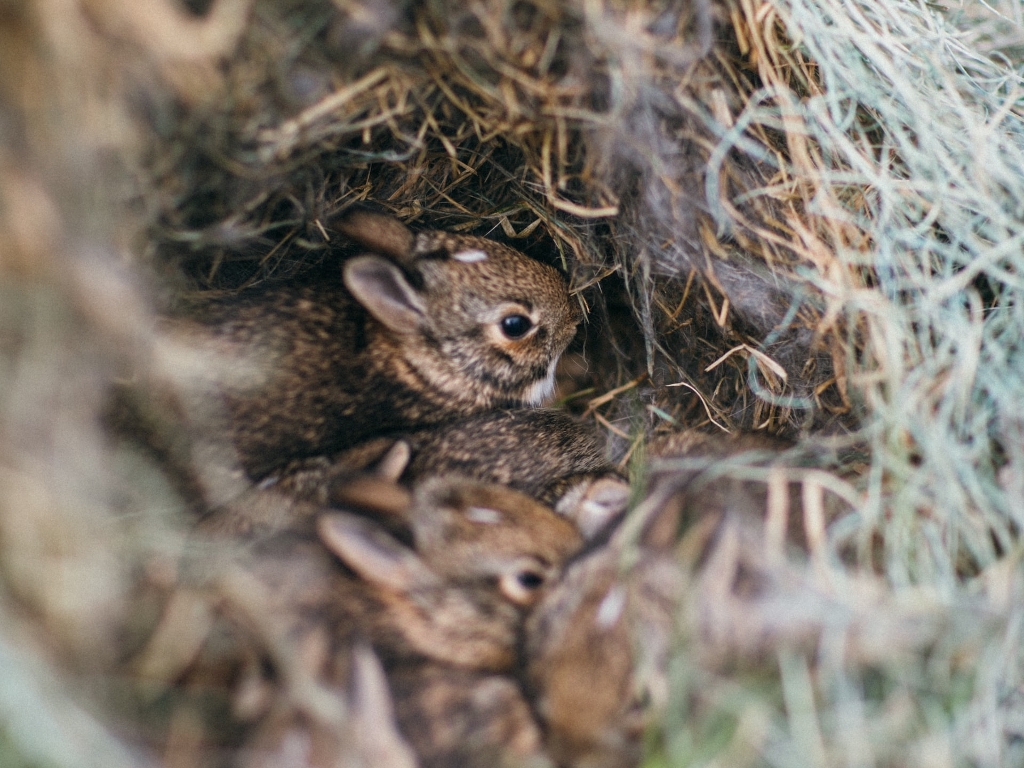Raising baby bunnies is a rewarding experience, but it also requires knowledge and care. This article in the All About Rabbits series provides a comprehensive guide to caring for baby bunnies, from their arrival home to the basics of feeding and socializing. With this guide, you will learn how to provide the best care for your new furry family members, and how to raise them into healthy, happy bunnies.
Basic Needs of Baby Bunnies
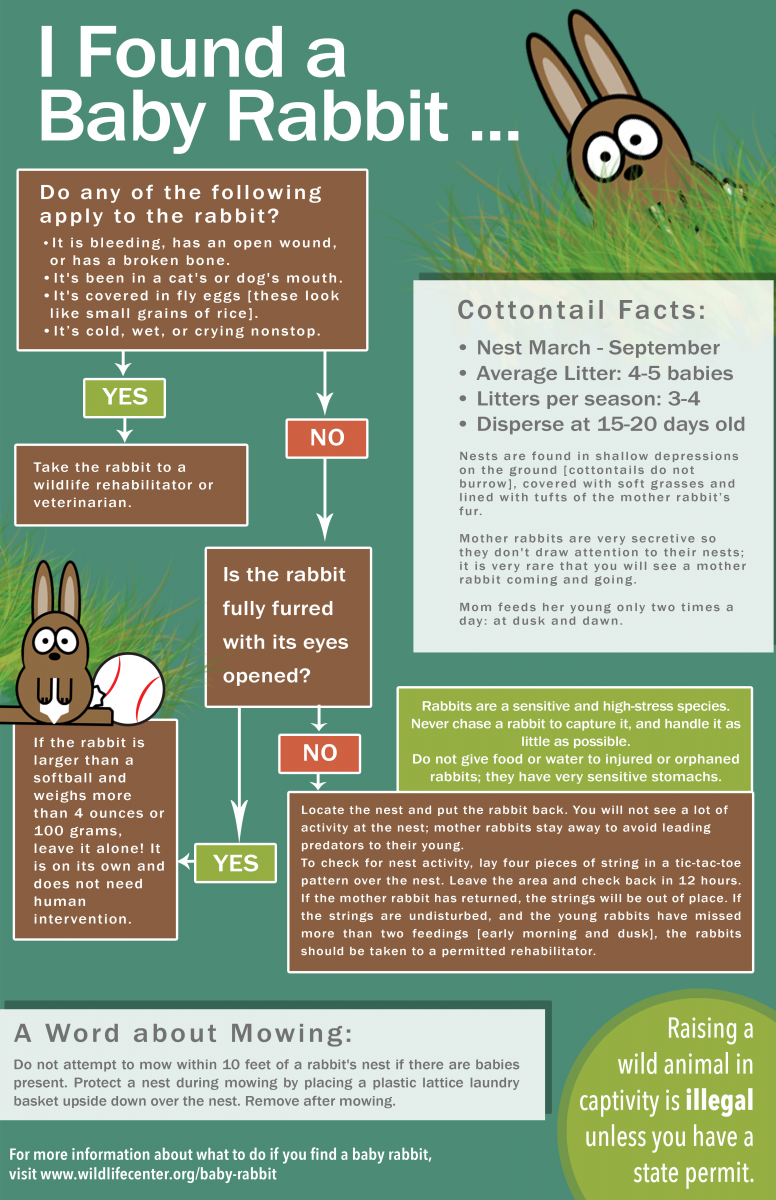
Food
Baby rabbits have very specific nutritional needs, so it’s important to feed them the right foods. A diet of high-quality hay should make up the bulk of their diet, supplemented with small amounts of fresh vegetables and specially formulated pellets. Avoid giving baby bunnies treats, as these can cause health issues.
Water
Fresh, clean water should always be available to baby bunnies. Check the water daily to make sure it’s clean and full, as baby bunnies are more prone to dehydration than adult rabbits.
Shelter
Baby bunnies need a safe, secure place to call home. A hutch should provide enough space for a baby bunny to move around and explore, while also keeping them safe from predators. Ensure the hutch is well ventilated and provides adequate shade in hot weather.
Space
Baby bunnies need plenty of space to play and explore. As they grow, they become more active and need room to move around and exercise. Providing toys and other items for your baby bunny to play with will help them to stay stimulated and active.
Overall, providing your baby bunny with the right food, water, shelter and space will help them to stay healthy and happy. With a little bit of care and attention, you can ensure your baby bunny has everything they need to thrive. With the right knowledge of how to care for baby rabbits, you can be sure that your pet will be healthy and content for many years to come.
Handling Baby Bunnies
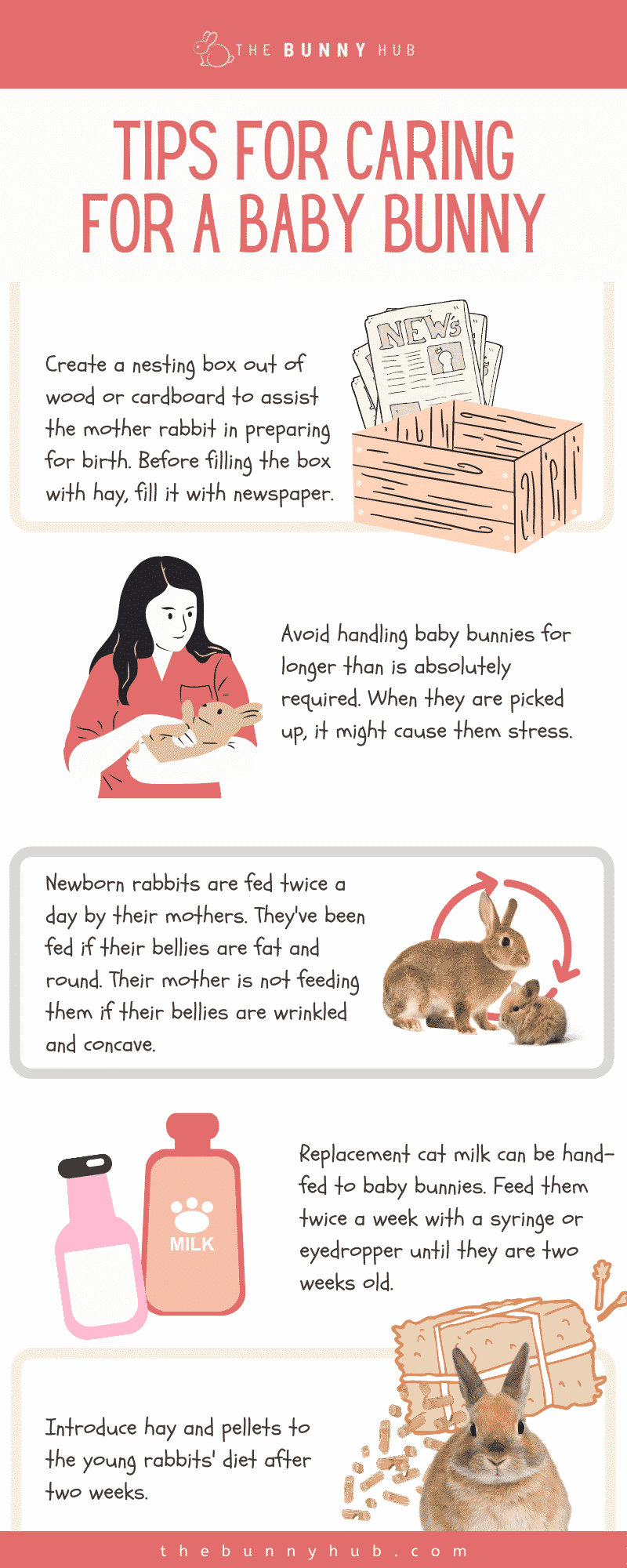
- Handle baby bunnies with gentle hands. Make sure to support their body with both hands and keep them close to your body for warmth.
- Always keep your hands clean and dry before handling baby bunnies, as the oils and bacteria on your hands can make them sick.
- Use a soft cloth or towel to handle baby bunnies, as this will help to keep them warm and relaxed.
- Keep your movements slow and calm when handling baby bunnies, as they may be frightened by sudden movements.
- Be patient and let the baby bunny come to you when you are handling them. Don’t reach for them or grab them, as this can make them scared.
- Never pick up a baby bunny by its ears, as this can cause pain and discomfort.
- Be sure to provide a safe and secure environment for baby bunnies while they are in your care. This means providing them with a warm, quiet place to rest and play.
Socializing Baby Bunnies
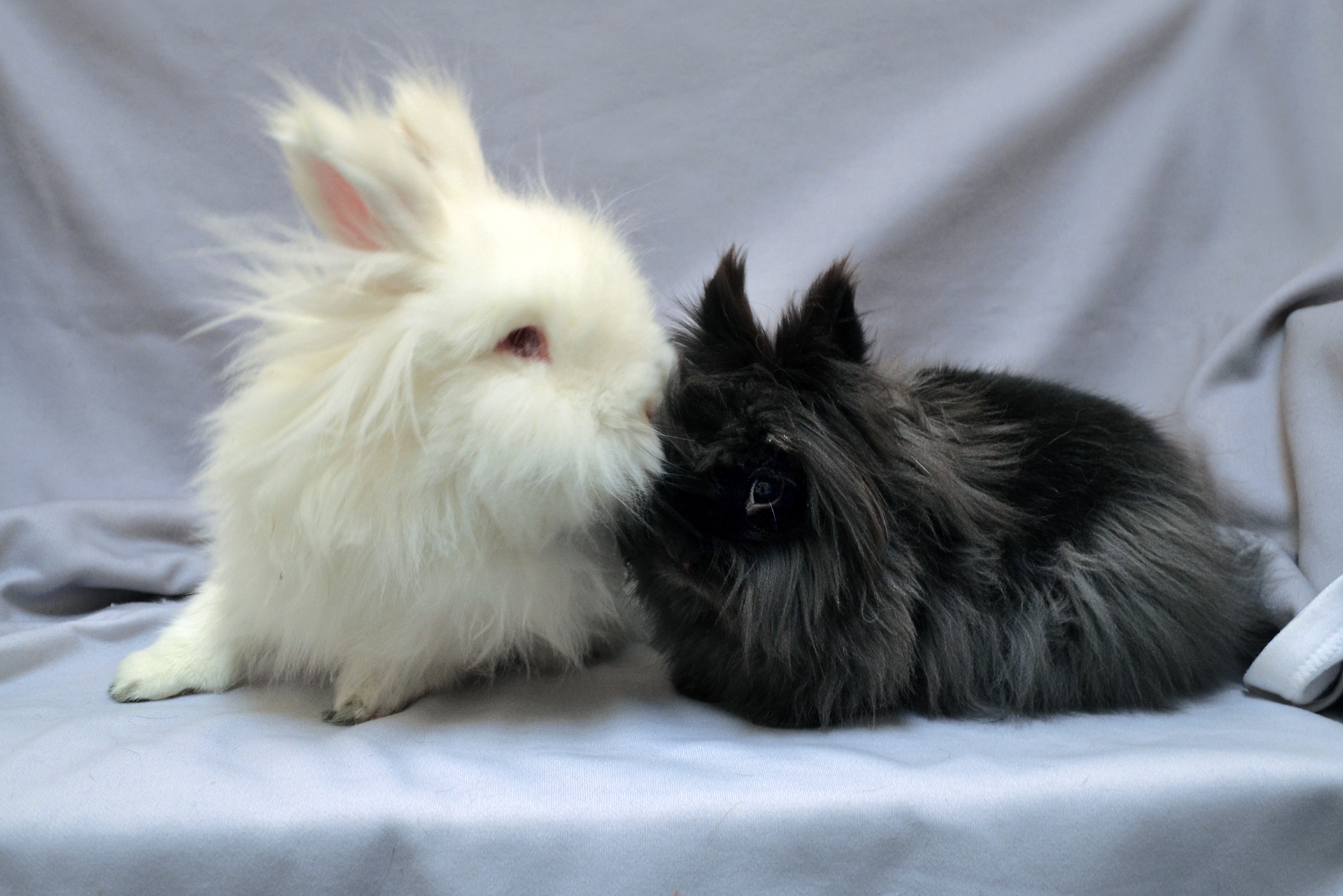
Once your baby bunnies are in their new home, it is important to begin socializing them right away. Socializing your bunnies will help them to become more confident and comfortable around you, as well as other people and animals. Here are some tips on how to socialize your baby bunnies:
- Handle Them Daily: Start handling your bunnies every day. Gently pick them up and pet them. This will help them to become used to being handled and will make them more comfortable with it.
- Introduce Them to Other Animals: If you have other pets in the home, take the time to introduce your bunnies to them. Make sure to supervise all interactions, and if any of your other pets seem too aggressive or scared, keep them separated.
- Encourage Interaction with People: Allow your bunnies to be around people, and encourage them to interact with them. Let children pet and hold your bunnies, and give them treats when they do. This will help your bunnies get used to the presence of people.
- Create a Positive Environment: Provide your bunnies with a safe, comfortable environment. Keep the noise level low, and make sure that their cage is easily accessible. This will help them to become more relaxed and secure in their new home.
These tips will help you to socialize your baby bunnies and ensure that they are comfortable with the people and animals around them. With proper socialization, your bunnies will grow up to be happy and healthy. Remember that how to care for a newborn bunny is important in the socialization process, so make sure to give them plenty of love and attention.
Monitoring Health of Baby Bunnies
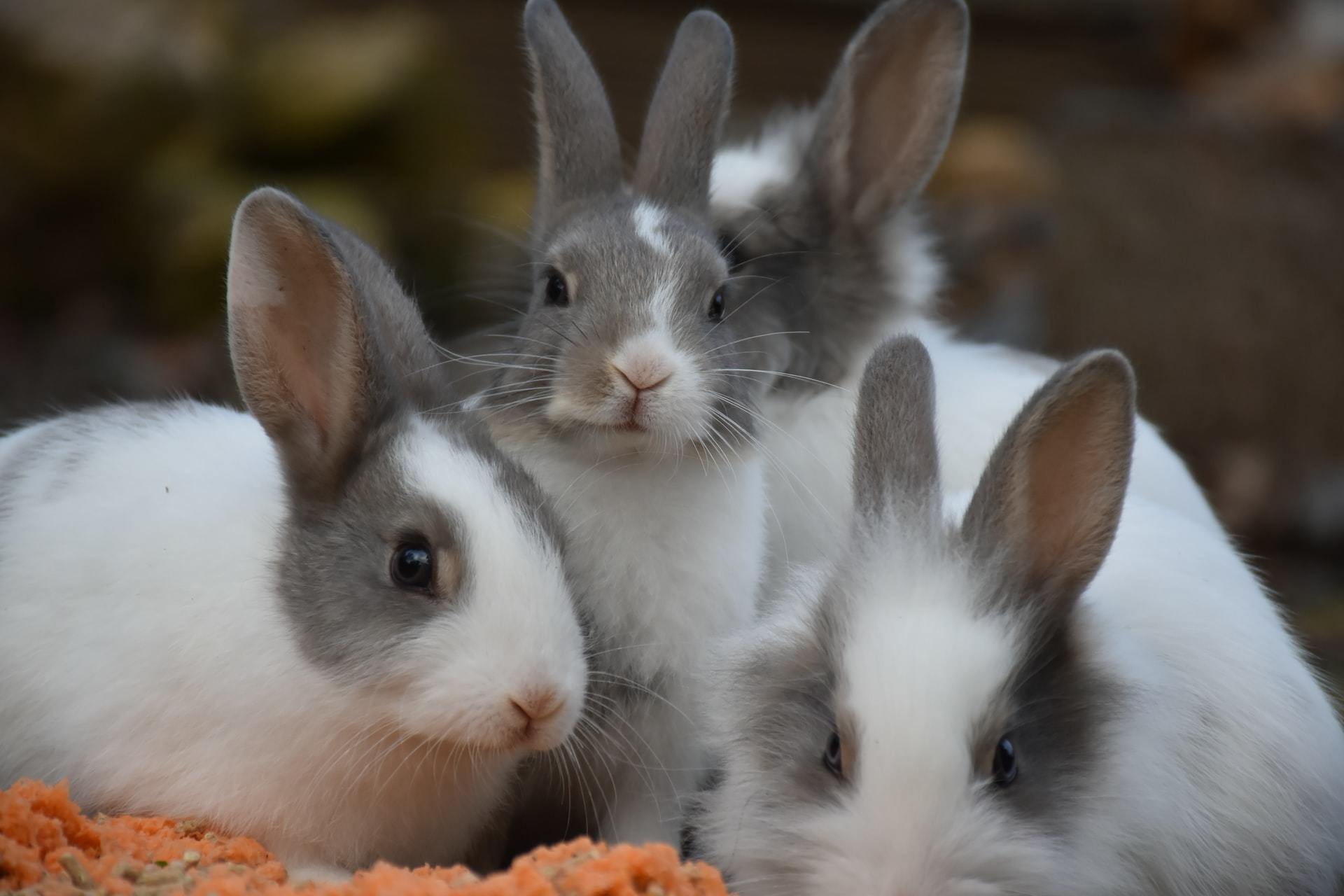
Ensuring the health of baby bunnies is an essential part of how to care for newborn bunnies. Monitor the baby bunnies for signs of illness or injury, and contact a veterinarian immediately if there are any concerns.
Physical Appearance: A healthy baby bunny will have a plump body with a full, soft coat. Check the fur for lice or mites. The eyes should be bright, clear, and alert. The nose should be clean and moist.
Weight: Baby bunnies should gain weight steadily as they grow. Monitor their weight weekly to ensure they are gaining adequately.
Activity Level: Baby bunnies should be active and alert. If they appear lethargic or are not moving around as much as usual, contact a veterinarian.
Eating Habits: Baby bunnies should eat regularly. Monitor their food intake and make sure they are consuming enough to gain weight appropriately.
Diarrhea: Diarrhea can be a sign of illness in baby bunnies. Monitor their droppings for any changes in consistency or color. If diarrhea persists, contact a veterinarian.
Temperature: Baby bunnies should be kept at a comfortable temperature, between 65-85 degrees Fahrenheit. Monitor the temperature of the environment to ensure it remains within this range.
By monitoring the health of baby bunnies, you can ensure they stay healthy and happy. If there are any concerns, contact a veterinarian immediately.
Grooming Baby Bunnies
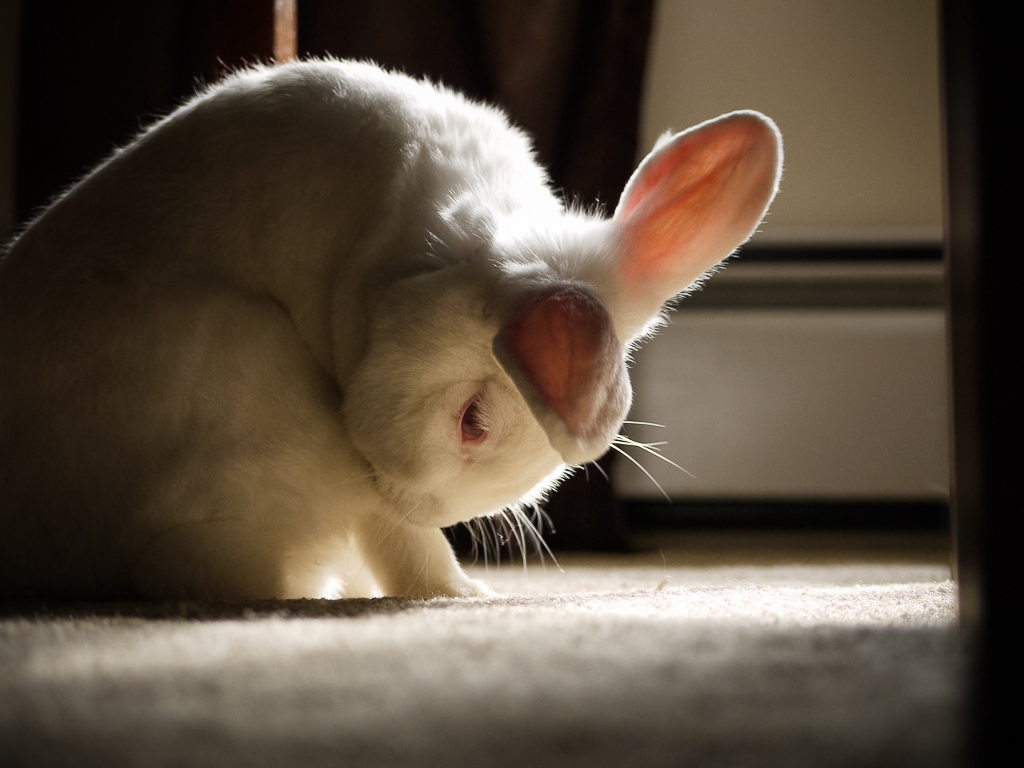
Baby rabbit care tips: Grooming is an important part of caring for baby bunnies. It helps keep them healthy, clean and comfortable.
| Grooming Activity | Frequency |
|---|---|
| Brushing | Daily |
| Bathing | As needed |
| Nail Trimming | Monthly |
| Tooth Brushing | Daily |
Brushing your baby bunny’s coat should be done daily, using a soft brush designed specifically for rabbits. This helps remove dirt and debris and redistributes natural oils, resulting in a soft and shiny coat. Bathing should only be done as needed, using a pet-safe, mild shampoo.
Nail trimming should be done monthly or as needed to maintain a healthy length. You can have a veterinarian or groomer do this, or you can learn how to do it yourself.
Baby bunnies should have their teeth brushed daily to help prevent dental problems. Use a pet-safe toothpaste and a soft-bristled toothbrush designed specifically for rabbits.
Baby rabbit care tips: Grooming is an important part of caring for baby bunnies. Regular brushing, bathing, nail trimming and tooth brushing help keep your bunny healthy, clean and comfortable.
Feeding Baby Bunnies
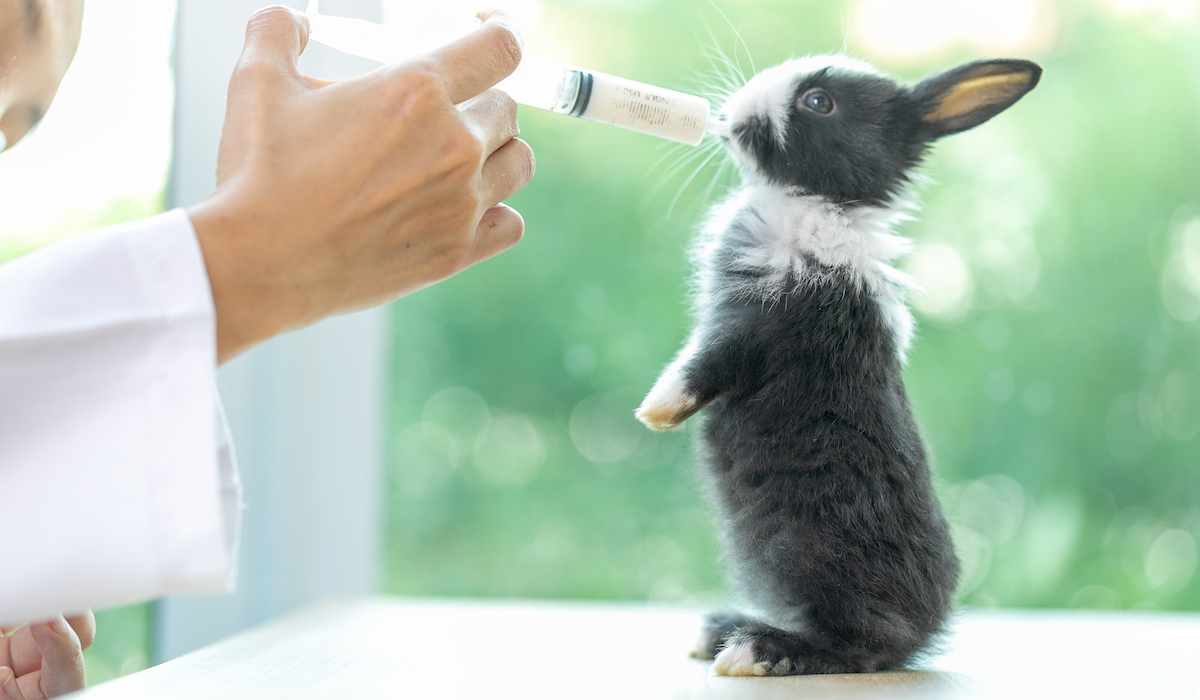
- Bottle Feeding: For newborn bunnies, bottle-feeding is the best way to ensure adequate nutrition. You will need a special milk-replacement formula, a small bottle, and a soft cloth. The milk-replacement formula should be tailored to the specific needs of rabbits. Warm the milk-replacement formula to body temperature and make sure it is thoroughly mixed. Use the cloth to support the bunny’s head and neck while the bottle is being given. Allow the bunny to suckle until it is full. Bottle-feeding should be done every few hours.
- Solid Food: After the first week, the bunny can begin to eat solid food. Start with a commercial rabbit food, as it is specifically formulated for the nutritional needs of rabbits. After a few days, you can introduce hay and fresh vegetables. Monitor your bunny’s eating habits and make sure it is getting enough food and water. Rabbits should have access to hay at all times.
Providing Appropriate Toys and Accessories
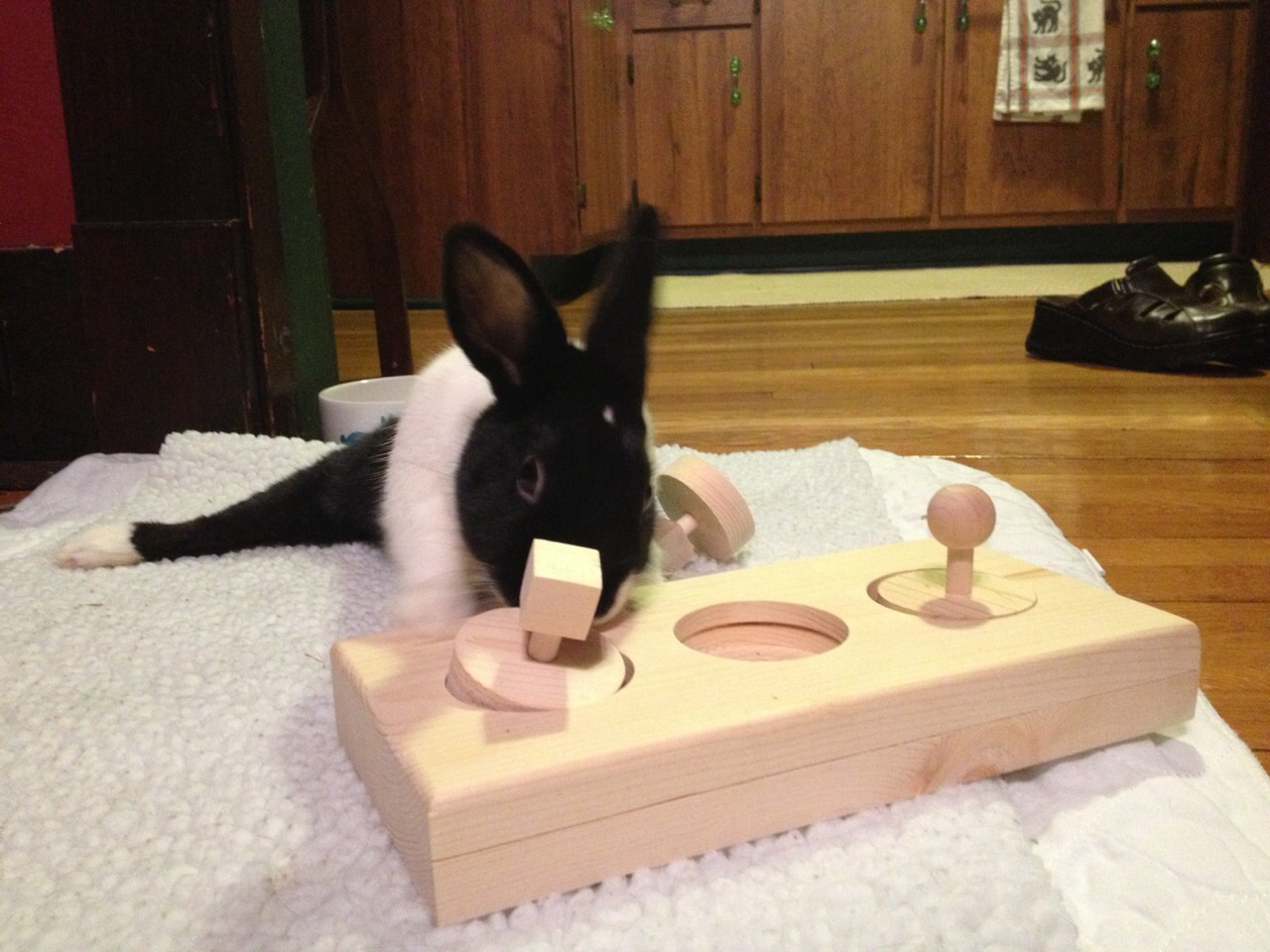
It is important to provide suitable toys and accessories for baby bunnies to keep them entertained and engaged. Toys should be safe, non-toxic, and chewable. Some good options include cardboard boxes and tubes, paper towel rolls, and paper bags. Bunnies also love to chew on sturdy sticks and twigs. You can also provide them with stuffed animals and hard plastic toys.
Accessories like ramps, tunnels, and ladders can also provide a source of entertainment for baby bunnies. Ramps, tunnels, and ladders can be made from cardboard, wood, or plastic and should be secured to the sides of the cage for safety. When making tunnels, it is important to make sure the opening is big enough for your bunny to fit through.
Bedding is also important for baby bunnies. Soft, absorbent bedding should be provided to keep them comfortable and warm. Bedding should be changed regularly to keep it clean and dry.
Treats should also be provided for baby bunnies. Treats should be healthy, such as fresh vegetables, hay, and fruits. Treats should be given in moderation to avoid overfeeding.
Providing appropriate toys and accessories is essential for keeping baby bunnies happy and healthy. By providing them with a safe and stimulating environment, you can help ensure your bunnies grow up to be healthy and well-adjusted.
Transitioning Baby Bunnies to Adult Care
1. Diet: As baby bunnies transition to adult care, their diet should also transition from formula-based to hay-based. This should start when they are around 8 weeks old. Alfalfa hay is a great source of nutrition for baby bunnies, and should be offered until the bunny is around 4 months old. After that, switch to a high-quality timothy hay. Additionally, fresh vegetables should be added to the bunny’s diet, such as carrots, pumpkin, and other leafy greens.
2. Exercise: Exercise is an important part of transitioning baby bunnies to adult care. It is important to provide a safe and secure area where the bunny can play and explore. This can be an outdoor area, or an indoor area with plenty of toys and activities to keep the bunny entertained.
3. Grooming: As baby bunnies transition to adulthood, it is important to start grooming them. This includes brushing the fur with a soft brush, trimming their nails, and cleaning their ears. This should be done regularly to keep them healthy and happy.
4. Socialization: Socialization is an important part of transitioning baby bunnies to adult care. This includes introducing them to other animals and people, teaching them how to interact with others, and providing them with plenty of love and attention. This will help them to become more social and outgoing.
5. Spaying/Neutering: Spaying or neutering your bunny is an important part of transitioning them to adult care. This will help to reduce the risk of certain health issues and will also help them to live a longer and healthier life.
Frequently Asked Questions
What should I feed baby bunnies?
Baby bunnies require specific nutrition to ensure proper growth and development. It is important to feed them the right food and to provide them with enough water. The following are some of the foods that should be included in the diet of baby bunnies:
- Mother’s Milk: The best food for baby bunnies is the mother’s milk. It is packed with essential nutrients and antibodies that will help them to grow and stay healthy. If the mother is unable to provide milk, then a commercial formula should be used.
- Hay: Hay should be included in the diet of baby bunnies. The hay should be of good quality and should be made of grass hay, such as timothy hay or oat hay. It should be given to them in small quantities and should be replaced regularly.
- Leafy Greens: Leafy greens should be given to baby bunnies in small portions. These greens should include kale, romaine lettuce, and dandelion greens. These greens should be washed thoroughly before being fed to the bunnies.
- Vegetables: Vegetables such as carrots, peas, and squash should also be included in the diet of baby bunnies. These vegetables should be cooked or steamed and should be chopped into small pieces.
- Fruits: Fruits such as apples, pears, and bananas are also great for baby bunnies. They should be given to the bunnies in small portions and should be cut into small pieces.
- Treats: Treats such as nuts, seeds, and dried fruits can also be given to baby bunnies. These treats should be given in moderation and should not make up the majority of their diet.
It is important to provide baby bunnies with a balanced and nutritious diet. They should be given enough food and water to ensure their health and growth.
How often should I clean the cage for baby bunnies?
Baby bunnies require frequent cage cleanings to ensure their health and safety. It is recommended to clean the cage at least once a week, preferably more, to maintain a healthy environment. Be sure to replace all bedding and nesting material, as well as remove and replace any soiled substrate. Additionally, check for any signs of health problems, such as mites, fleas, and parasites. Cleaning the cage will also help to prevent any potential illnesses.
How often should I handle baby bunnies?
Handling baby bunnies should be kept to a minimum until they are 8-12 weeks old, as it can be stressful for them. After this age, it is important to handle them for a few minutes each day to get them used to human contact. When handling baby bunnies, it is important to be gentle, calm, and patient. Pick them up carefully and talk to them reassuringly. Make sure to keep them warm and secure, and avoid sudden movements or loud noises.
How can I tell if a baby bunny is unhealthy?
Signs of an unhealthy baby bunny include lethargy, diarrhea, dull fur, weight loss, runny eyes and nose, and abnormal breathing. If your baby bunny exhibits any of these symptoms, contact your veterinarian right away. Additionally, keep an eye out for fleas, ticks, mites, and other parasites, which can cause serious health issues. Lastly, check your baby rabbit’s teeth and nails to make sure they are not overgrown and causing discomfort.
How can I introduce my baby bunnies to other pets?
When introducing your baby bunnies to other pets, you must take precautions to ensure the safety of everyone involved. Start by introducing them in a neutral space, such as a hallway or bathroom, and observe the interaction. If the interaction is positive, gradually move them to a larger space. If the interaction is hostile, separate them immediately. You should also monitor the pets for signs of stress, including excessive vocalizing and aggressive posturing. Finally, be aware of the potential for territorial disputes, as rabbits may become aggressive if they feel their territory is threatened.
Conclusion
Raising baby bunnies is a rewarding experience and requires patience, commitment, and research. Knowing the basics of bunny care, how to properly feed and water them, how to create a safe environment and how to handle them, is key to raising healthy and happy bunnies. With proper care and nurturing, baby bunnies will grow into loving, social pets.
References
- Raising Baby Rabbits, PetMD.
- Basic Care for Rabbits, PETA.
